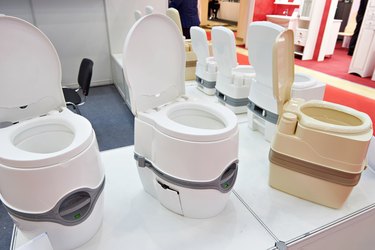
A composting toilet is sometimes preferred for its low water usage and effect on the environment. However, not all compost toilets are the same, and not all states allow the use of composting toilets within certain city limits.
Before you install a composting toilet in a basement nook in a city home or in a cabin nestled far off in the woods, consider what your needs are, how often you plan to use the specialty commode, the rules and regulations of your area, and your level of commitment to cleaning the solid waste.
Video of the Day
Video of the Day
Composting Toilet Maintenance
One of the main disadvantages of a composting toilet is the need for consistent maintenance to ensure it is working appropriately, according to the Green Building Alliance. Before purchasing and installing a composting toilet, consider what the model's maintenance needs are.
A composting toilet that is properly assembled and correctly operated should require little more than a brief inspection about once a month. Performing a monthly once-over of the fixture and any connecting systems is needed to ensure that a problem is addressed before it becomes unmanageable. The fewer connections, covers and openings the fixture has, the less maintenance it will likely need.
Depending on the system, the lines and connections should be checked regularly. If unpleasant odors are present, they could be caused by a problem with the seals or connections. Check the covers and connections for any structural issues with the seals around the rear and bottom of the toilet. Avoid adding bleach, ammonia or chemical cleaners to a composting toilet as these products will kill the beneficial microbes that are necessary for breaking down solid waste. Ensure that only organic matter goes in the bowl to help prevent problems.
Waste-Removal Considerations
A major disadvantage of a composting toilet is the need to handle human waste regularly. The waste needs to be removed weekly or monthly.
Ecoflo Wastewater Management notes that the removal of the broken-down solid waste depends on how often the toilet is used and the brand of composting toilet. Some composting toilets have easily removable canisters with firmly placed lids and waste-release systems, while others require more hands-on removal and cleaning.
Cost of Composting Toilets
A composting commode may be a greener option, but it definitely requires more greenbacks. The specialized system has a more significant upfront cost than that of a traditional toilet.
Depending on the complexity of the waste-removal or processing system, a composting toilet starts at around $1,400, according to American Home Shield. If installing a septic tank to hold the waste and cut down on maintenance and removal, the cost is about 75 percent more than the commode.
Approval for Composting Toilets
Those who are looking to live off the grid or prefer to compost their daily waste rather than send it into the sewer system need to know the local codes and regulations before unplugging or constructing with a composting toilet in mind. This can be a disadvantage when compared to a traditional toilet that can be installed and set up to connect to a city sewer line.
Buying a composting toilet that is National Sanitation Foundation (NSF) certified can make it easier to be in compliance with your area's codes and regulations.